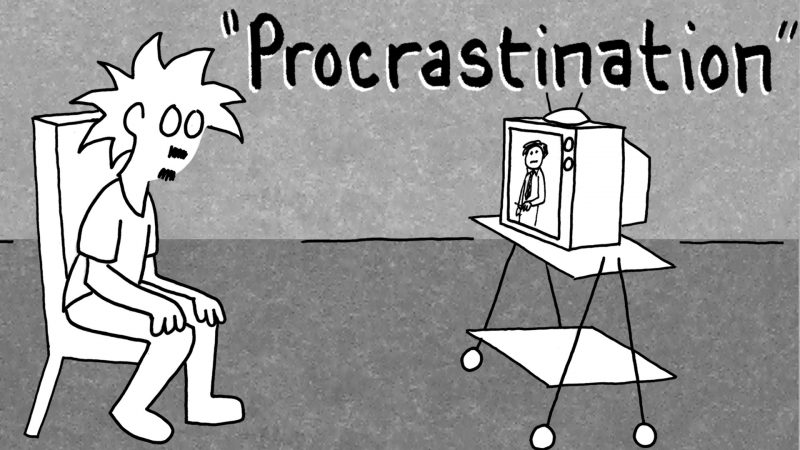The word “procrastination” is still not very familiar to anyone, but every person has at least once encountered the phenomenon that he designated. Moreover, it is becoming more common, and some researchers consider it one of the main psychological problems of the 21st century. The proposed material will tell about what procrastination is and how to deal with it.
Material Content:
- 1 What is procrastination in simple words?
- 2 Causes of occurrence
- 3 The main symptoms and signs
- 4 People who are prone to illness
- 5 How to identify people suffering from procrastination?
- 6 Procrastination Control Methods
- 7 How to motivate yourself to fight?
- 8 Possible consequences
- 9 The main mistakes of procrastinating people
What is procrastination in simple words?
The scientific term “procrastination” has a funny, everyday analogue - “companionship”. It is formed from the words “for later” and denotes a person’s tendency to postpone the performance of certain tasks and assignments at the last moment.
Procrastination as a property of the psyche is known to people a long time ago. Not without reason in many countries related sayings arose. For example, the ancient Romans - "Tomorrow, tomorrow, always tomorrow - this is how life goes." For Russians - “Until the thunder strikes, the man will not cross himself.”
Despite the antiquity of the problem, the English psychologist Noach Milgram proved in his works: over the past quarter century, this phenomenon has hit the vast majority of the urban population of the planet. The “companionship” literally follows on the heels of such psychological epidemics as dependence on social networks, distracted attention, conspicuous consumption, self-narcissism, and so on.
Causes of occurrence
Some believe that procrastination is just a beautiful synonym for ordinary laziness. As proof, the lines of an old German song are cited: "Tomorrow, tomorrow, not today - this is what idlers say."However, this is a very superficial look at the problem.
Laziness has a very indirect relation to the "companionship", and sometimes not at all. Among procrastinators, there are sometimes real workaholics.
The true causes of procrastination lie much deeper than it seems at first glance:
- Excellent student syndrome. This is the desire to fulfill everything on the "five". It is closely related to the pathological form of perfectionism - the belief that only the ideal result of work has value. It is not surprising that over time the nervous system does not stand up, and a person begins to be afraid not to live up to his own expectations. Work becomes a constant stress for him, and he subconsciously puts it off for later.
- Loser syndrome. The opposite situation with the same result. The man is convinced that all the fruits of his labor have no value: "No matter what I do, everything goes to dust." A deeply rooted sense of doom to failure paralyzes the will, makes work joyless, and as a result, any business is put aside.
- Chronic overwork. It is it that becomes the cause of the development of procrastination in workaholics. The nervous system is not able to work long without rest. After some time, she begins to resist stresses beyond the will of man. And the “companionship”, in this case, is only a harbinger of more serious violations, both psychological and somatic.
- Syndrome of the "emergency worker". It is especially common among freelancers who independently form their work schedule. Not everyone can sit down and work regularly when no one is above the soul and does not control the process. Delaying the execution of work to the last minute, a person artificially creates for himself a “rush”, forcing to mobilize internal resources.
Experts also highlight another, rather rare reason for the development of procrastination - fear of success.
This particular phobia sometimes affects very talented people. Realizing that the fruits of their labor will cause public interest, they are panicky afraid of increased attention to their personality, to private life. As a result, such people are engaged in anything but the realization of their talent.
The main symptoms and signs
The following symptoms allow recognition of procrastination:
- a person voluntarily and with pleasure takes up any work, but for a long time cannot force himself to begin to carry out its work;
- performing work, a person is often distracted by extraneous unimportant actions: goes to smoke, drink coffee, leafs through a social network feed, etc .;
- when they begin to tighten the deadlines, a person either enters emergency mode and does everything at the last moment, or finds a reason for further postponement of work.
To distinguish procrastination from ordinary laziness, the main sign helps - the degree of motivation to work. With laziness, motivation is completely absent. A person consciously strives for idleness, and only leisure gives him the necessary inner comfort.
Unlike the bummer, the procrastinator sincerely wants to work.
But not today, but tomorrow.
People who are prone to illness
“Subterfuge” is to one degree or another inherent in every person. This property is quite natural as long as it lends itself to control. Problems arise when all life begins to be built according to the laws of procrastination.
Most often, the transition from a natural to a pathological form occurs in people at risk:
- pessimists with low self-esteem;
- perfectionists;
- people doing too much work for a long time;
- people who do not know how to plan their time and are not capable of self-discipline.
Practicing psychologists note that the "mocking" is characteristic of the vast majority of high school students and students.
With some reservations, procrastination can be considered a quality of youth. Even realizing the importance of learning and having a high motivation for success, young people give priority to interpersonal communication.
How to identify people suffering from procrastination?
Recognizing procrastinator is quite simple, if you rely on the above symptoms. As long as such a person does not “burn the earth under his feet”, he will wander aimlessly, surf the Internet, call up friends, watch TV and make an impression of being sloppy. The procrastinator dictionary often contains expressions such as “No inspiration”, “I have a breakdown” or “Don't put off what you can do the day after tomorrow”.
In a separate group of procrastinators, we can distinguish those who mask the delay in the performance of important work by busy activities. Such people are constantly busy with something: they participate in flash mobs, sign a lot of petitions, have a great correspondence, attach homeless animals, and polemize in political forums. And their main business, meanwhile, is not being done.
Procrastination Control Methods
If the "maternity" has gotten out of control and reduces the quality of life, you need to figure out what caused it.
Just finding out the reason, you can understand how to deal with procrastination:
| Cause | Fighting technique |
|---|---|
| Excellence Syndrome and Loser Syndrome | 1. Convince yourself that any work result is valuable. Do not be ashamed to do something not good enough. A low result in personal terms is even more important than a high one, since it opens up prospects for internal development. 2. To learn to enjoy not from an external assessment of labor, but from the process itself. To do this, you need to look at work from a new angle - as a self-sufficient phenomenon. It doesn’t matter "what Princess Marya Alekseevna will say." The important thing is “I did it.” |
| Chronic overwork | 1. Make yourself a full vacation. 2. Arrange revision of goals and objectives, separate important from unimportant, set priorities. 3. Reformat the work schedule. Spend most of the time on important tasks. Less important is either to leave a minimum amount of time or to delegate them to someone. 4. Distribute efforts: do not undertake a new business without completing the previous one, do not plan work far ahead, move in small steps. Large-scale tasks to be solved in stages, breaking them into elements. |
| Syndrome of the "Avalanche" | 1. Make a daily planner and master time management. Start and end a working day by the hour, even with a free work schedule. 2. Do not record a lot of things for a short time in a diary. Separate important tasks from secondary ones, the solution of which can really be postponed. 3.Big job to break into a chain of mini-tasks. It is mini-tasks to include in the daily plan - it is psychologically easier to undertake them. |
| Fear of success | 1. To think that success is not necessarily related to publicity. There are many ways to avoid the close attention of the public to your person. 2. Convince yourself that only the realization of one’s own abilities makes life meaningful. 3. Implement a time management system, remove from the schedule all unimportant tasks that distract from the main one. |
The most important problem to be solved by a procrastinator of any type is getting rid of fear of work.
This is much easier to do if you remember an important rule: "Elephants need to be eaten in pieces."
Any serious work seems to be such an “elephant”, which is psychologically difficult to approach. Therefore, it is necessary to mentally separate the "trunk", "ears", "legs" and other parts, and include in the work plan not the entire task, but its elements, 1-2 per day.
How to motivate yourself to fight?
For the inveterate procrastinator, not only the question of how to get rid of the “child-care”, but the problem of motivation is of great importance. Many are so accustomed to living according to the laws of procrastination that they no longer think of themselves outside this system.
To motivate yourself to change, you need to realize: procrastination eats up strength and shortens life.
And this is not an exaggeration.The procrastinator, putting off work until the deadline, feels internal discomfort, is burdened by this condition, feels guilty. This causes a breakdown, and the remaining internal resources are then burned in the “emergency”.
Possible consequences
The consequences of prolonged procrastination can be as follows:
- increase in energy costs of labor at the same time the inability to work effectively
- complete loss of desire to do something and a breakdown;
- the development on this basis of persistent neurosis with irritability, self-frustration and unproductive self-flagellation;
- the occurrence of depressive disorders with somatic manifestations.
In the long run, such a lifestyle can seriously affect human health.
The main mistakes of procrastinating people
Getting rid of procrastination, you need to try to avoid two mistakes. Firstly, you do not need to mechanically force yourself to work without first solving the main problem. Inductions like “Get a rag!” Will not help. The source of the “companionship” is internal conflict, not laziness or lack of collection.
Secondly, you should not blame yourself for failures. On the contrary, it is necessary to learn to praise yourself for the work done, for a day spent in vain. Motivation for change should be positive.
Getting rid of the “companionship” very quickly gives a visible result. Former procrastinators almost immediately notice how much more they manage to do in a period of time. At the same time, satisfaction with the quality of work and oneself is increased. It is not for nothing that in the east the outstanding case is compared with a heavy load. Do not drag it on yourself all your life.





















